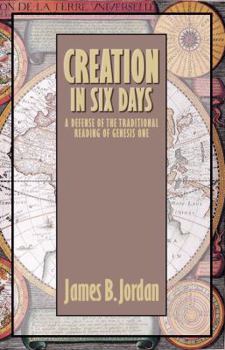Creation in Six Days: A Defense of the Traditional Reading of Genesis One
Select Format
Select Condition 
Book Overview
Jordan's account is primarily designed to answer any approach to the text of Genesis, such as the increasingly popular Framework Hypothesis, that pits the text's literary features against its... This description may be from another edition of this product.
Format:Paperback
Language:English
ISBN:1885767625
ISBN13:9781885767622
Release Date:December 1999
Publisher:Canon Press
Length:272 Pages
Weight:0.90 lbs.
Dimensions:0.7" x 5.6" x 8.5"
Related Subjects
Christian Books & Bibles Education & Reference Religion Religion & Spirituality TheologyCustomer Reviews
3 ratings
Wonderful defense of six-day creation
Published by Thriftbooks.com User , 14 years ago
First Things has called James Jordan one of the greatest unknown theologians of the 20th century. In this book, Jordan sets about to look at the creation account in Genesis from a Biblical perspective. The subtitle says the book is a defense of the traditional view, but in actuality it is more of an offensive mounted against a number of the "alternative" theories floating around in more Reformed Evangelical circles like the framework hypothesis and others. He defends the traditional view in taking down these others and revealing that they cannot stand. The last few chapters are then his defense of how he views the first chapters of Genesis. One of the most innovative and profound insights in the book is his point that the "framework hypothesis" and all the others drive a wedge between reality and literature. They assume that because Genesis is written in a literary pattern that it is therefore not historical. Jordan points out (correctly) that this is a subtle form of gnosticism, the hatred of the physical reality and the love of the ethereal. He then defends the creation account by pointing out the symbolism and narrative patterns, and shows how the God of the Bible is the sort of God who arranges history to run in symbolic patterns for us to find. Thus, he walks the narrow road between historical account (which we arrogant moderns assume has no literary or symbolic dimension) and literature (which we arrogant moderns assume has no historical or "true" dimension). Simply a fantastic book. He is no fundamentalist, taking everything in a woodenly literal sense, something that I have found many creationists fall into. Instead, he shows the only perspective that does justice to history and to literature is the traditional, six-day creationist position.
Essential book for much-needed reformation of Evangelicalism
Published by Thriftbooks.com User , 21 years ago
I am now translating this book into Japanese. It is aimed primarily at Evangelicals who affirm biblical inerrancy, yet also feel compelled to try to reconcile the Genesis creation account with the views of modern science. Older, discredited theories of this type -- the "Gap Interpretation" (or "Ruin-Reconstruction Interpretation": there is a gap of indeterminate time between Genesis 1:1 and 1:2, during which the world of a presumed pre-Adamite race was destroyed and then rebuilt) and the "Day-Age Interpretation" (each "day" is actually a vast amount of time) -- are glossed over; instead Jordan focuses on some of the newer theories now in vogue or coming into vogue among Evangelicals, such as John Sailhamer's "Limited Geography Interpretation," which says that the Genesis creation account actually describes the creation of the land of Canaan, not the whole world. Other Evangelicals interacted with include Bruce K. Waltke, Meredith G., Kline, C. John Collins, Paul H. Seely, Mark Futato, and C. Lee Irons.As the book's title makes clear, Jordan doesn't think such approaches -- that pit the literary features of Genesis 1 against the plain historical and narrative sense of the text -- are viable. Rather, he thinks the people of God have been correct all along (i.e., for the past 3,000 years) in interpreting Genesis 1 as referring to the creation of the entire universe in six consecutive 24-hour days. He covers all the theories contrary to the traditional reading that are currently popular among Evangelicals and shows how none of them stand up to close scrutiny. He also shows how the presuppositions of unbelieving science make it a weak reed to lean upon, and drives home the point that modern Christians have been too credulous toward, and subtly influenced by, the constructs of unbelieving science, with the result that their worldview is partly orthodox and partly gnostic. ("Gnosticism" meaning a religious perspective that emphasizes Christianity as a religion of ideas rather than as a religion rooted in actual time-based historical events in the physical world.) If the historical factuality of Genesis 1 is suspect, then, ultimately, so is just about everything else that is said to take place in the Bible -- even, for example, the resurrection. Of course, no Bible-believing Christian wants to say *that*, but if the non-historical approach to Genesis 1 is legitimate, then there is no logical barrier to extending that approach to everything else. If all that the Genesis creation account tells us about the first Adam cannot be taken at face value, then what are we to make of statements like 1 Corinthians 15:21-22 ("For since by man came death, by Man also came the resurrection of the dead. For as in Adam all die, even so in Christ all shall be made alive.") or Romans 5:12-21 ("Therefore, just as through one man sin entered the world, and death through sin, and thus death spread to all men, because all sinned . . . where sin abounded, grace abounded much mo
A significant defense in the Reformed tradition
Published by Thriftbooks.com User , 23 years ago
Jordan defends the traditional reading of the creation account with a command of biblical theology rarely encountered. But Jordan does more. He precisely and convincingly identifies exegetical errors in opposing positions. Moreover, he reveals the subtle influences of gnosticism and false assumptions of "science" which are behind modern interpretations. This is an outstanding contribution.--Rev.James Bordwine, Th.D. I highly recommend this book!





